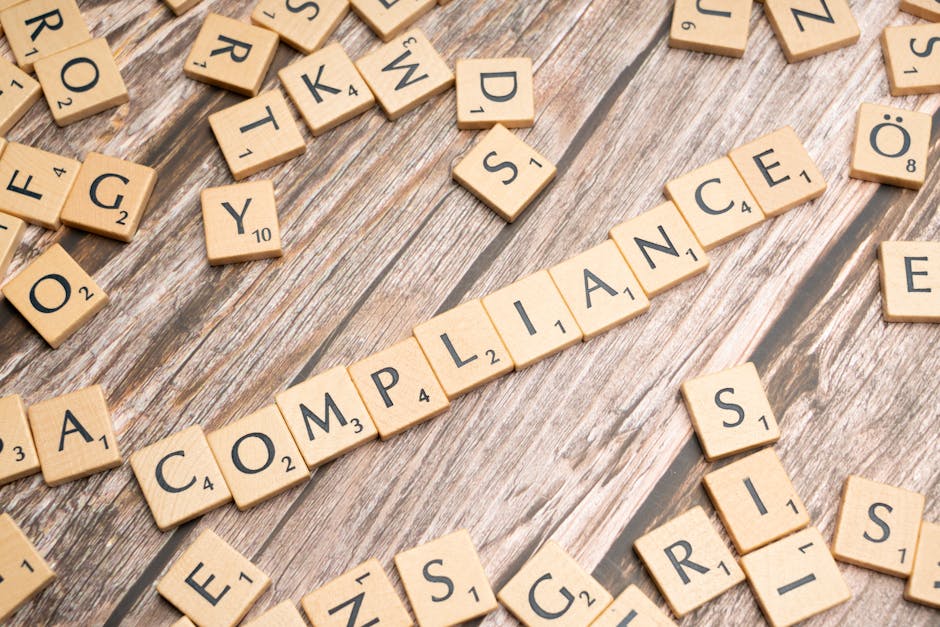Achieving GDPR compliance might seem like navigating through a maze with a blindfold on, especially for small to medium-sized enterprise owners striving to grow in a digital landscape. At its core, GDPR compliance means ensuring your business handles personal data with the utmost care and respect, abiding by a robust set of rules designed to protect individuals’ privacy in the European Union.
For businesses, the importance of GDPR compliance cannot be overstressed. It’s not just about avoiding hefty fines; it’s about building trust, enhancing your reputation, and ensuring long-term sustainability by respecting data privacy. Techtrone understands the unique challenges you face, aiming to provide scalable, easy-to-implement solutions. Our goal is to make GDPR compliance not just an obligation but a stepping stone towards better business practices.

Understanding GDPR Compliance
When we talk about GDPR compliance, we’re diving into the heart of how businesses handle personal data. This isn’t just about ticking boxes; it’s about reshaping the way we think about privacy and data protection.
Definition:
At its simplest, GDPR compliance means your organization follows the rules set out by the General Data Protection Regulation. This European Union law, which took effect on May 25, 2018, is all about giving individuals more control over their personal data.
Goals:
The GDPR has three main goals:
1. Protect personal data: It’s all about keeping individual’s data safe and sound.
2. Empower individuals: People should know what data is being collected and have a say in how it’s used.
3. Set a standard: By creating a unified regulation across the EU, the GDPR aims to simplify the regulatory environment for international business.
Scope:
This is where things get interesting. The GDPR doesn’t just apply to companies based in the EU. If you’re processing the personal data of EU residents, whether you’re in the US, Asia, or anywhere else, the GDPR applies to you. This wide-reaching scope makes GDPR compliance a global concern.
- Material Scope: If you’re collecting, storing, using, or doing pretty much anything with personal data, you’re in the GDPR’s domain.
- Territorial Scope: It doesn’t matter where your organization is based. If you’re dealing with the data of people in the EU, you need to comply.
The GDPR outlines specific obligations for organizations, such as limiting how personal data can be used and ensuring individuals have certain rights over their data. This includes the right to access their data, the right to have incorrect data corrected, and the right to have their data erased under certain conditions.
Why It Matters:
You might wonder why all this matters. Beyond the hefty fines for non-compliance, which can reach up to €20 million or 4% of your annual global turnover, GDPR compliance is about building trust. Data breaches and misuse of personal information are top concerns for consumers. By adhering to GDPR principles, you’re showing your customers that you value and protect their privacy.
In Summary:
Understanding GDPR compliance isn’t just about knowing the rules. It’s about embedding a culture of privacy and data protection in your organization. From the way you collect data to how you store, use, and dispose of it, GDPR compliance touches every aspect of your business. And remember, this isn’t a one-time effort. As your business evolves, so too will your approach to GDPR compliance.
By embracing these principles, you’re not just avoiding fines; you’re paving the way for a more secure and trustworthy relationship with your customers. And in a world where data is king, that’s a powerful stance to take.
Let’s move on to figuring out if the GDPR applies to your business and what that means for your operations.
Does GDPR Apply to Your Business?
Wondering if the GDPR monster knocks on your door too? Let’s break it down, simple and clear.
Extraterritorial Scope
First up, location, location, location! But surprise, it doesn’t matter where your business sits—Europe, the US, or anywhere else. If you’re playing ball with folks in the EU, you’re in the game. That’s right, the GDPR has a long arm, reaching far beyond Europe’s borders.
U.S. Companies, Listen Up!
For my friends running businesses from the star-spangled shores of the US, here’s the deal: If you’re collecting, storing, or processing data of people living in the EU, GDPR knocks on your door. Selling goods or services to EU citizens? Check. Monitoring their behavior, like tracking cookies on your site? Another check. It’s not about where you are; it’s about who your customers are.
Data Controllers vs. Processors
Now, let’s talk roles because in the GDPR world, who you are matters.
- Data Controllers: You call the shots on why and how personal data is processed. Think of a school deciding what student info to collect for registration.
- Data Processors: You do the heavy lifting based on instructions from controllers. Picture a cloud service storing that student info for the school.
Both roles come with responsibilities under GDPR. Controllers, you’re in charge but don’t forget, processors need to stick to the rules too.
A Real-world Example
WhatsApp got slapped with a €5.5 million fine for not playing by the rules, specifically for not being transparent about data processing. This highlights the importance of clear communication and lawful data handling practices.
So, Does GDPR Apply to You?
Ask yourself:
– Do I offer goods or services to people in the EU?
– Do I monitor the behavior of individuals in the EU?
If you nodded yes to either, welcome to the GDPR club. It’s not just about avoiding fines; it’s about respecting privacy and building trust. And trust, my friends, is the currency of the digital age.
Next up, let’s dive into the heart of GDPR—the principles that guide it. Buckle up; we’re demystifying the legal jargon and making it as easy as pie.
Achieving GDPR compliance isn’t just a legal checkbox. It’s a commitment to privacy, security, and respect for user data. Stick with us as we guide you through this journey, making GDPR compliance within reach for your business, no matter where you are or what you do.
The 7 Main Principles of GDPR
Getting GDPR compliance right means understanding its core principles. Think of these as the foundation of a house. Without a strong foundation, the house won’t stand. The same goes for GDPR compliance. Let’s break down these principles in simple terms.
Lawfulness, Fairness, and Transparency
- Lawfulness: Your actions with data must follow the law. This means you can’t just collect or use personal data because you want to. You need a legal reason.
- Fairness: Treat people’s data the way you’d want yours treated. Don’t use it in ways that could unfairly harm them.
- Transparency: Be clear and open about how you’re using personal data. No secrets or fine print.
Purpose Limitation
You must have a clear reason for collecting personal data and only use it for that reason. Think of it like this: if you collect data for a newsletter, you can’t use it to also send sales emails, unless you’ve made that clear from the start.
Data Minimisation
Only collect what you absolutely need. If you’re making a cake, you wouldn’t add ingredients that don’t belong. The same goes for data. More isn’t always better.
Accuracy
Keep the data accurate and up to date. If someone tells you their information has changed, update it. It’s like keeping your contacts list current so you don’t send a birthday card to the wrong address.
Storage Limitation
Don’t keep personal data longer than you need it. Once it’s served its purpose, it’s time to say goodbye and securely delete it. Imagine it as cleaning out your fridge: you wouldn’t keep leftovers until they spoil.
Integrity and Confidentiality (Security)
This is about keeping data safe. Use strong locks and alarms for your data, just like you do for your house. Encryption, secure passwords, and access controls are your best friends here.
Accountability
You’re responsible for following these principles and must be able to show how you’re doing it. It’s like being a scout leader; you need to know where your scouts are and what they’re doing under your watch.

Case Study: WhatsApp’s €5.5 million fine by the Irish DPC showed what happens when transparency and lawfulness are overlooked. They were penalized for not being clear about the legal basis for processing user data, underlining the importance of these principles.
Fact: A 2019 Pew study found that only 1 in 5 adults always or often read a privacy policy before consenting, highlighting the need for clear and accessible information as mandated by the GDPR.
By embracing these principles, you’re not just avoiding fines; you’re building trust with your users. They’ll know their data is in safe hands, which is priceless in today’s digital world.
Next, we’ll dive into the practical steps to take to ensure your business aligns with GDPR, from assessing your data to training your team. Stick with us to make GDPR compliance as easy as pie.
Key Steps to Achieve GDPR Compliance
Achieving GDPR compliance might seem like climbing a mountain, but with the right steps, it becomes a series of manageable hikes. Let’s break it down into simpler, actionable parts.
Assess Your Data
Data mapping is your starting point. Think of it as creating a map of where all personal data in your organization comes from, where it goes, and how it’s used. It’s like tracking the journey of a letter from when you drop it in the mailbox until it reaches its destination.
You’ll also need to identify the types of personal data you handle. This can range from names and email addresses to more sensitive data like health information or religious beliefs. If it can identify a person, it counts.
Sensitive data deserves extra attention. Because of its nature, mishandling it can have serious consequences. It’s like handling a delicate vase; extra care is needed to ensure it doesn’t break.
Appoint a Data Protection Officer (DPO)
The role of a DPO is to oversee data protection strategy and ensure compliance with GDPR. Think of them as the captain of your GDPR compliance team.
Their responsibilities include educating the company and its employees on compliance requirements, monitoring adherence to GDPR standards, and being the point of contact between the company and regulatory authorities.
Appointing a DPO is necessary for public authorities, organizations that engage in large scale systematic monitoring, or handle a lot of sensitive data. It’s like having a safety officer on a construction site; their expertise keeps everyone safe.
Implement Data Protection Measures
Privacy by design means considering privacy at the start of any new project or process. It’s like planning an exit route before you enter a building.
Encryption and security protocols are your tools to protect data. Encryption scrambles the data so that it can’t be read without a key, and security protocols are the rules and measures used to protect data from unauthorized access. It’s akin to locking your valuables in a safe.
Manage Consent and Rights
The right to access, right to be forgotten, and data portability are fundamental rights under GDPR. They allow individuals to see their data, request deletion, and move their data respectively. It’s like giving someone control over their letters in your mailbox.
Consent mechanisms must be clear, specific, and voluntary. Imagine asking someone for permission to use their tools; you need to explain why you need them and they have to agree willingly.
Prepare for Data Breaches
A breach notification plan involves having a process to quickly inform authorities and affected individuals about a data breach. Think of it as having a fire alarm system in place; it’s crucial for safety.
Your response plan should outline the steps to take after a breach to mitigate its effects. It’s like having a first aid kit and knowing how to use it.
Supervisory authority is your point of contact in case of a breach. They’re like the fire department, there to help when things go wrong.
Train Your Team
Awareness and GDPR training programs are essential to ensure everyone knows the importance of data protection and how to achieve it. It’s like teaching everyone in a lab how to handle chemicals safely.
Ongoing education keeps the team updated on new regulations and practices. It’s like keeping your first aid skills up to date; you hope you won’t need them, but you must be ready.
By taking these steps, GDPR compliance becomes less of a daunting task and more of a structured approach to protecting personal data. The goal is to make data protection a seamless part of your business operations, not just a checkbox on a list. With Techtrone’s guidance, achieving GDPR compliance can be a straightforward path to ensuring your business not only meets legal requirements but also builds trust with your users. They’ll know their data is in safe hands, which is priceless in today’s digital world.
Moving forward, let’s address some of the most frequently asked questions about GDPR compliance to clear any lingering doubts.
Frequently Asked Questions about GDPR Compliance
When it comes to GDPR compliance, there are always questions. It’s a big topic, and getting it right matters. Here, we’ll tackle some of the most common queries businesses have.
What are the penalties for non-compliance?
The short answer: They can be hefty.
Non-compliance with GDPR can lead to fines of up to €20 million or 4% of the company’s global annual turnover of the previous financial year, whichever is higher. But it’s not just about the fines. There’s also the risk of damaging your reputation and losing the trust of your customers.
For example, tech giants like Google and Facebook have faced fines of more than €100 million for GDPR violations. And it’s not just the big players; smaller businesses are also at risk. In Italy, a utility company faced fines totaling €11.5 million for multiple GDPR violations. These examples underline the importance of compliance and the potential financial and reputational risks of non-compliance.
How does GDPR affect marketing activities?
The main impact: Consent is key.
GDPR has changed the way businesses approach marketing, putting the focus on consumer consent. You can’t just send marketing emails because you have someone’s email address. The person must have given clear consent to receive marketing communications from you.
This means rethinking your sign-up forms, making sure they include an unambiguous opt-in for marketing communications. It also means being transparent about how you’ll use the data.
GDPR compliance is not just about avoiding fines; it’s about respecting your customers’ privacy and building trust. This can actually improve your marketing by ensuring that you’re engaging with people who are genuinely interested in what you have to offer.
Can small businesses be exempt from GDPR?
The straightforward answer: No, size doesn’t matter.
GDPR applies to all organizations that process the personal data of EU residents, regardless of the company’s size. Whether you’re a solo entrepreneur or a multinational corporation, if you handle the personal data of EU residents, GDPR applies to you.
However, the regulation does take the size of your business into account in other ways. For instance, smaller organizations might not need to appoint a Data Protection Officer (DPO) unless their data processing operations are complex or involve large volumes of sensitive data. But this doesn’t mean small businesses can be lax about compliance. The principles of GDPR, such as data minimization and securing consent, apply across the board.
In conclusion, GDPR compliance is a must for businesses of all sizes. It’s about protecting your customers’ data and maintaining their trust. And remember, compliance is not a one-time effort but an ongoing process. By taking the right steps, such as appointing a DPO when necessary, implementing strong data protection measures, managing consent properly, preparing for data breaches, and training your team, you can make GDPR compliance part of your business’s DNA.
With these FAQs addressed, achieving GDPR compliance might seem like a daunting task, but with the right approach and tools, it’s entirely manageable. And remember, the long-term benefits of compliance far outweigh the initial efforts.
Conclusion
Achieving GDPR compliance is not just about ticking boxes and avoiding fines. It’s about building a culture of trust with your customers, enhancing your company’s reputation, and ensuring the long-term security and integrity of your data. The journey towards compliance might appear challenging, but the rewards are significant and multifaceted.
Long-term Benefits
First and foremost, GDPR compliance strengthens your cybersecurity measures, making your business more resilient against data breaches. This is crucial in today’s digital age, where cyber threats are becoming more sophisticated. By securing personal data, you’re not just complying with regulations; you’re protecting your business’s lifeblood.
Moreover, compliance builds trust. When customers know their data is treated with the utmost care and respect, their confidence in your brand grows. This trust is invaluable, translating into loyalty and, ultimately, sustained business growth.
Another significant benefit is the competitive advantage GDPR compliance gives you. When data breaches are common, demonstrating your commitment to data protection can set you apart from competitors. It’s a clear signal to customers and partners that you’re a responsible and trustworthy entity.
Achieving Compliance with Techtrone
At Techtrone, we understand that GDPR compliance can seem overwhelming. That’s why we’re here to guide you through every step of the journey. Our comprehensive cybersecurity services are designed to make compliance straightforward and stress-free.
From assessing your data and implementing robust data protection measures to managing consent and preparing for potential data breaches, our team of experts has the knowledge and experience to ensure you meet all GDPR requirements. We also offer ongoing education and training for your team, ensuring GDPR compliance is woven into the fabric of your business operations.
GDPR compliance is an ongoing process, not a one-time effort. With Techtrone as your partner, you can stay ahead of regulatory changes and continue to foster a culture of data protection and privacy within your organization.
In conclusion, GDPR compliance offers a pathway to not only avoid hefty fines but to build a stronger, more trustworthy brand that values and protects its customers’ data. With the right approach and support from Techtrone, achieving compliance can be a smooth and rewarding journey. Let us help you turn GDPR compliance from a daunting task into a strategic advantage for your business.




